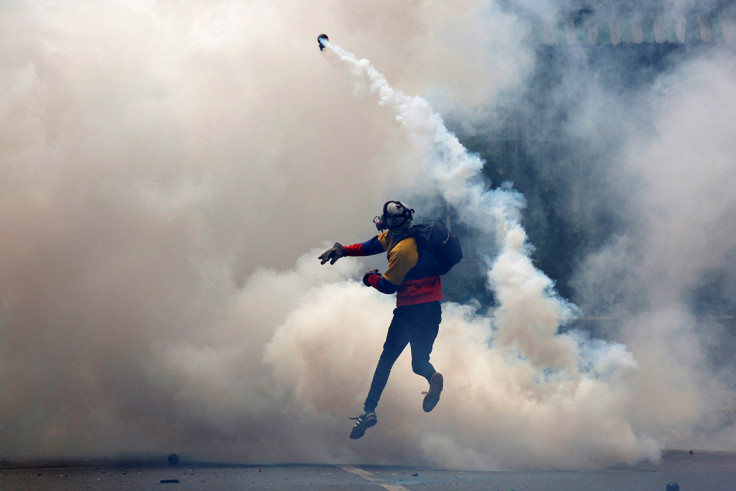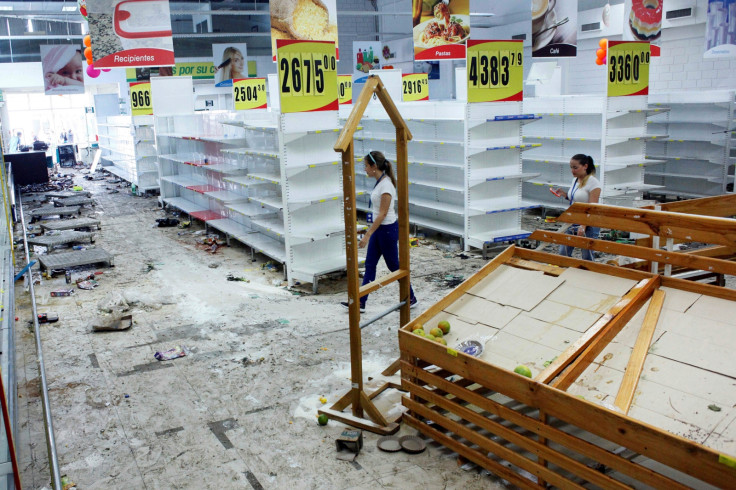Venezuela crisis: Over 2,000 soldiers sent to border state hit by looting
At least three people, including two teenagers, have lost their lives in the state of Tachira in a week.
Venezuelan government said it was sending more than 2,000 troops to a border state on Wednesday, 17 May, to control looting and rioting amid ongoing anti-government protests.
The troops are being sent to the Venezuelan state of Tachira under the operation "Plan Zamora", which was planned to control the situation. "I have ordered the transfer of 2,000 guards and 600 special operations troops," Defence Minister Vladimir Padrino Lopez said while speaking on state television on Wednesday..
He added that the military operation in Tachira was part two of "Plan Zamora", which was first put into action in the Carabobo state.
The first execution of the plan had witnessed heavy presence of armed forces in the region, which led to large-scale arrests of anti-government protesters and trial by the military court.
However, Defence Minister Lopez tried to restore citizens' confidence into the government during the Wednesday address, and said that the presence of military in Tachira was for their good.
He also said that the armed forces would not use weapons against civilians, and would not be carrying pistols and machine guns.

Though most shops and businesses remain closed and guarded by the soldiers in San Cristobal, capital of Tachira state on the Colombian border, looting continued in some remote parts, the BBC reported.
People were seen looting stores and escaping with basic items such as coffee, diapers and cooking oil in the crisis-hit nation from where even basic foods and medicine have disappeared from shelves.
At least three people, including two teenagers, have lost their lives in Tachira in a week.
The 15-year-old Jose Francisco Guerrero died in hospital, a day after he was shot during the middle of looting in San Cristobal.

"My mom sent my brother yesterday to buy flour for dinner and a little while later, we received a call saying he'd been injured by a bullet," Guerrero's sister Maria Contreras, waiting for his body to be brought to a San Cristobal morgue, was quoted as saying by Reuters.
Meanwhile, on Tuesday, President Nicolás Maduro extended the nationwide state of economic emergency for another 60 days, which gives him the authority to impose tougher security measures across the country.
The decree by the president has been condemned by the opposition and it alleged him of trying to hold the control in his hands.
Anti-government demonstrations started in the country in early April after the Supreme Court annulled the opposition-dominated National Assembly and remove lawmakers' immunity. Although the court retracted the ruling, there is still widespread anger against the government.
At least 43 people have died across the country and around 300 have been injured in several rallies over the past month.
However, the latest protests were intensified by a recent move by Maduro, in which he calls for rewriting the country's constitution in a bid to control the ongoing protests against his government.
But the government's opponents and critics have said that the president's move towards a constitutional shake-up is a "coup".
Despite having the world's largest known oil reserves, Venezuela is going through an unprecedented economic crisis.

While Maduro's critics blame him for the disaster in the country, the president has alleged that the opposition and business community are responsible for the shortage of essential supplies.
The socialist president has accused his opponents of blocking the supply of medicines to create a health crisis, which would help them plan a coup against him.
The country's economic miseries are likely to take a turn for the worse, with the International Monetary Fund (IMF) predicting that inflation will rise to 720% in 2017 and to over 2,000% in 2018.
Venezuela's acute shortage of almost everything from food to vaccines has forced thousands to cross the country's borders. People are moving to Brazil and Colombia, seeking better life.
© Copyright IBTimes 2024. All rights reserved.





